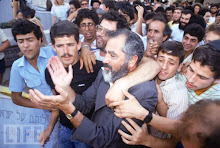Rosh Hashanah is nearly upon us, and since many of my readers don't really know what this Holy Day is all about I will give you a basic rundown.
First of all, Rosh haShanah is the start of the new year according to the Jewish calendar, or the first day of the Hebrew month of Tishrei. However, the Jewish calendar is a bit different than our western calendar, thus, Tishrei is actually the 7th month of the Hebrew year. Nissan, the month of Passover, is actually the first month of the year, but the calendar year changes on Tishrei.
Rosh Hashanah is also considered to be the birthday of the world, or the day upon which God completed creation. If you think of each month according to the Hebrew calendar representing one of God's days of creation, than after 6 months of work on the 7th month God rested. Thus Rosh Hashanah is considered to be the day when creation was COMPLETED and God rested.
Rosh Hashanah is also the beginning of the "days of awe" which culminate on Yom Kippur, the day of atonement. During this time, Jews reflect on the past year, concentrate on repenting for how we came up short in God's eyes, and do our best to correct our shortcomings. This is the final 10 days that we Jews can repair what we've done before our judgment is sealed in God's book for the year. We pray a lot for forgiveness, and when we "confess" to our transgressions from the year we do it aloud, in unison, from the prayer book, saying "al chaits" to a long list of sins, as we all have at times during the year been guilty of making bad choices and letting our "yatzer hara", or evil inclination, get the better of us.
In the end, we pray that God will mercifully grant us a spot in His book of life for the coming year.
Rosh Hashanah is only a one day observance according to Torah, but since the time of the Mishnah, around 200CE, we have observed 2 days. The reason is that it often took so long for the messengers to discern when the new moon for the new month was shining that often times the call to the people didn't go out until the day had nearly come and gone. In that time the Temple had been destroyed, remember, and the Jews were much more dispersed than before, so the Rabbis determined that because of the importance of this day we must observe 2 days of Rosh Hashanah to guarantee that we all may observe Rosh Hashanah properly in God's eyes.
During the ancient days, the way a new month was signaled was by hilltop blastings of the Shofar, or ram's horn, from one hill to the next, until all Jews were notified. After the calendar was able to be done mathematically, the need for a 2nd day was less important, but because we are dispersed to so many time zones, and because our traditions have been always for two days of observance, all Jews still observe 2 days of Rosh Hashanah (except Reconstructionist and Reform). Thus, hearing the blasts of the Shofar is still a requirement to this day on Rosh Hashanah, as it signifies the coming of the New Year, as well as celebrating the end of creation.
Incidentally, the Jewish year is considered "lunisolar", meaning we measure the months by the moon and the years by the sun. Therefore, there are "leap month's" every few years, and months where an extra day is added when necessary so that the seasons are all lined up as Torah tells us. The calendar is incredibly precise, and complicated, as you can probably imagine.
Finally, we have a lot of eating (naturally). Honey and apples are traditional foods used to represent a sweet and fruitful year to come. So, let me now wish all of my friends who visit me here, may you have a sweet and joyous year, and may God inscribe you in his book of life.
Shana Tova
-MZ
Thursday, September 21, 2006
Subscribe to:
Post Comments (Atom)

0 comments:
Post a Comment
Thank you for commenting. Respectful debate and dissent are welcomed. MZ reserves the right to censor for any reason without explanation.